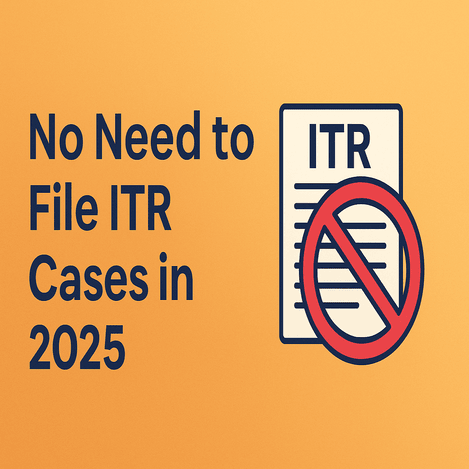Situations Where ITR Filing Won’t Be Required in 2025
Every year, the Income Tax Department of India updates its rules and requirements for filing Income Tax Returns (ITR). For Assessment Year 2025-26 (Financial Year 2024-25), it’s important to understand who is exempt from filing ITRbased on their income sources and limits.
In this article, we will explain which individuals do not need to file ITR in 2025, and under what conditions this exemption is allowed.
Individuals with Income Below the Taxable Limit
If your total income from all sources is below the basic exemption limit, you are not required to file an ITR.
Basic Exemption Limits (FY 2024-25):
| Category | New Tax Regime | Old Tax Regime |
|---|---|---|
| Individuals below 60 years | ₹3,00,000 | ₹2,50,000 |
| Senior Citizens (60–80 years) | ₹3,00,000 | ₹3,00,000 |
| Super Senior Citizens (above 80 years) | ₹3,00,000 | ₹5,00,000 |
Example: If a 59-year-old individual has an annual income of ₹2.90 lakh and does not claim any deductions or exemptions, they are not required to file ITR.
Individuals with Only Interest or Pension Income and No TDS
If your income comes only from savings account interest, fixed deposits, or pension and no TDS has been deducted, and your income is within the exemption limit, then filing ITR is not mandatory.
Individuals with Only Agricultural Income (Below Limit)
If you have only agricultural income, and it is below ₹5,000, you are not required to file ITR.
However, if your agricultural income exceeds ₹5,000, and your non-agricultural income exceeds the basic exemption limit, ITR filing becomes mandatory under the rule of partial integration.
Housewives or Students with No Taxable Income
If a housewife or student has no taxable income or only receives gifts, allowances, or pocket money from family (which are not taxable), then there is no need to file an ITR.
NRIs with No or Minimal Indian Income
Non-Resident Indians (NRIs) who do not earn income in India, or whose Indian income is less than ₹2.5 lakh, are not required to file an ITR.
Income Only from Dividends and Savings Interest Below Limit
If your income comes only from dividends and savings interest and it remains below the basic exemption limit, then filing ITR is not necessary.
ITR Filing Not Required for Specified Senior Citizens – Section 194P
Section 194P of the Income Tax Act (introduced from FY 2021–22) provides relief to certain senior citizens (75 years or above) from filing ITR if the following conditions are met:
Eligibility for ITR Exemption under Section 194P:
- The individual is a Resident Senior Citizen aged 75 years or above.
- The senior citizen has only pension income and interest income from the same bank.
- The senior citizen has submitted a declaration to the bank in a prescribed form.
- The bank is a specified bank notified by the Income Tax Department.
- The bank computes and deducts tax on such income after giving effect to deductions (like 80C, 80D, etc.).
If all conditions are satisfied, the senior citizen is not required to file an ITR. The bank is responsible for deducting the appropriate tax.
 Example:
Example:
Mr. Sharma, aged 77, earns:
- ₹4.8 lakh pension,
- ₹1 lakh interest from the same SBI branch,
- Submits Form 12BBA to SBI for deductions and tax computation.

Situations Where ITR Filing is Mandatory Despite No/Zero Income
Even if your income is below the exemption limit, you must file ITR if:
- You are a director in a company or partner in an LLP
- You have deposited over ₹1 crore in a bank account in a year
- You spent over ₹2 lakh on foreign travel
- Your electricity bill exceeds ₹1 lakh in a year
- TDS Deducted of Rs.25000 or more (Rs.50000 for senior citizens)
- If Turnover of business is 60 Lakh or more and receipts from profession is 10 lakh of more
- You are claiming a tax refund
Exemption from ITR filing is available to specific categories of taxpayers based on their income type and amount. If you fall under any of the above categories and your income is below the threshold, you are not required to file an ITR.
However, filing ITR is always beneficial, even when not mandatory. It helps in:
- Getting loans
- Visa applications
- Income proof for future references
- Claiming TDS refunds
Therefore, take an informed decision after understanding your income structure.

